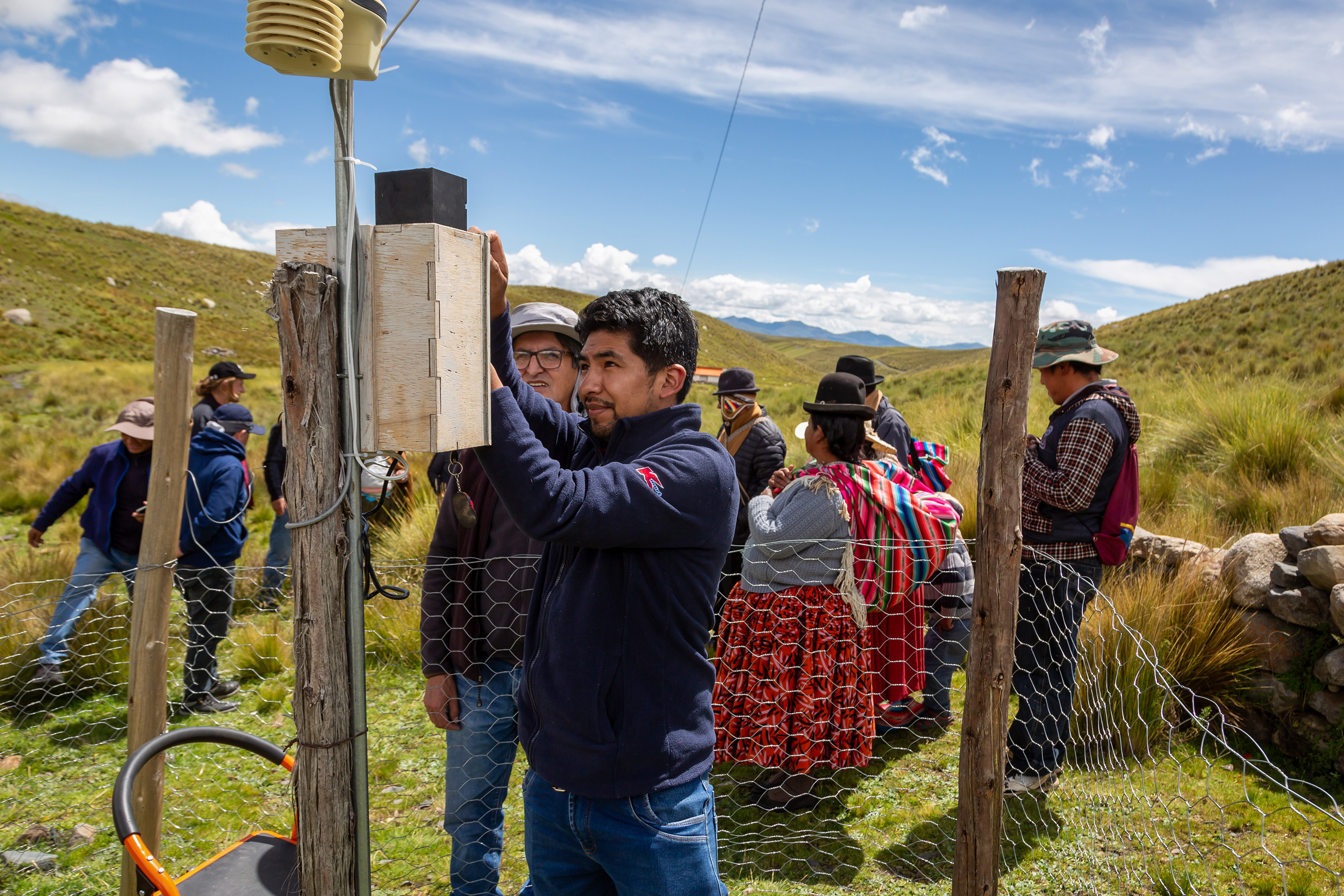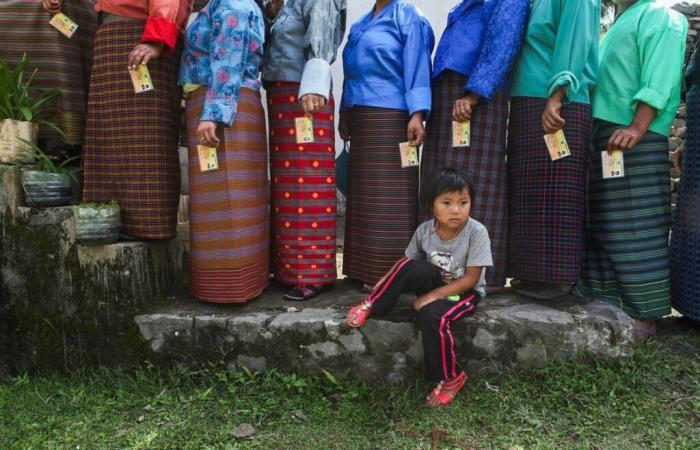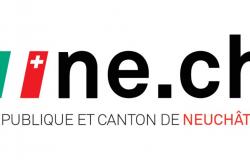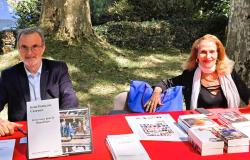
A polling station in Timphu during the last parliamentary elections, which took place on January 9, 2024.
Afp Or Licensors
Helvetas was the first international development organisation in Bhutan, in 1975. Many see the fact that the Swiss aid organisation is now withdrawing from the Himalayan country as the next chapter in a success story. This view is shared by local Helvetas employees.
This content was published on
August 29, 2024 – 08:29
The collaboration between Switzerland and Bhutan began with a friendship. In the 1940s, the daughter of a Swiss industrialist couple met a Bhutanese woman who would later become the king’s wife.
This friendship brought the industrialist couple to Bhutan in 1952, and the king of the time asked them for help in modernizing his country. Very quickly, specialists from Switzerland went to the Buddhist kingdom to advise the population on agriculture or the construction of dispensaries.
In 1975, the couple wanted to entrust the work, which was growing in size, to a professional structure. They chose the Swiss development organization Helvetas, already active in neighboring Nepal.
Switzerland-Bhutan: a “special relationship”
For half a century, Switzerland has maintained a relationship with the small kingdom that the Federal Department of Foreign Affairs still describes today as a “special relationship”.External link».
Lionel Giron, regional coordinator for Nepal, Bhutan and Vietnam at Helvetas.
Helvetas / Maurice K. Gruenig
“Initially, the focus was mainly on education, agriculture and forestry,” says Lionel Giron, regional coordinator for Nepal, Bhutan and Vietnam at Helvetas.
Forests have always played a special role for the Buddhist kingdom located on the edge of the Himalayas. The territory is 70% covered by forests. The many trees not only help to keep the climate in balance — Bhutan is even negative in terms of CO2.
Forestry also provided Bhutanese people with an introduction to practical democracy, at a time when the country was still an absolutist monarchy.
Cooperative approach to forest management
In 1979, the king decided to make the forest economy more participatory. Helvetas then introduced the concept of communal forest groups, which function like cooperatives. The forests are managed by village communities; each household can only cut down a certain number of trees per year. What they do not need themselves is sold.
The proceeds from the sale are paid into the community fund, from which members can obtain credit, for example to pay school fees. Every two years, the profits are distributed to the members. A system reminiscent of that of cooperatives.
The concept, which was also supported by the Swiss state and the World Bank, is still successful today. More than 600 village communities are organized into community forest groups.

On the way in the forests of Bhutan.
Helvetas
Forest groups, drivers of a living democracy
In addition to resource exploitation, the groups also serve as forums for discussing other issues — especially since the transition to democracy was launched. “Forest groups contribute greatly to the development of a living democracy,” explains Lionel Giron.
Bhutan’s democracy is one of the newest in the world. King Jigme Khesar Namgyel Wangchuck succeeded his father to the throne in 2006. He inherited his father’s plans to make Bhutan a democracy. Previously, all decisions were made by the central government and the monarch as the supreme authority.
The coronation on November 6, 2008, of Jigme Khesar Namgyel Wangchuck, successor to his father Jigme Singye Wangchuck, as “Dragon King” of Bhutan.
Petra Wiehe / Keystone
The decision in favor of the new form of government is also linked to the Bhutanese philosophy of Gross National Happiness, which measures not only economic progress but also the satisfaction of society. And the king at the time was of the opinion that in the long run, sharing power is better for the happiness of the people.
Democrats by confidence in the king
However, the approximately 800,000 people of Bhutan were not really looking for more participation, as Tashi Pem, country director for Bhutan at Helvetas, explains: “They revered their king and were therefore rather worried that he would no longer have decision-making power.”

Tashi Pem, Country Director for Bhutan at Helvetas.
Helvetas And Patrick Rohr
But given their trust in their king, they accepted his decision and elected a bicameral parliament for the first time in 2008. Since then, four parliamentary elections have been held, followed by peaceful changes of power. The last election was held earlier this year, with a turnout of about 66%.
But how does democratization work in a state where the king is revered as the sole sovereign? This is precisely the point on which Switzerland was consulted. In fact, the Swiss Agency for Development and Cooperation (SDC), which financed a large part of the projects, already wanted to withdraw from the country in the 2000s.
But in 2008, Bhutan’s central government asked him to assist in its transition to democracy. This request also shifted Helvetas’ priorities in Bhutan.
Less centralism
“With the introduction of democracy, the first thing to do was to decentralize tasks,” explains Lionel Giron.
In concrete terms, decentralisation took the following form: part of the administrative tasks that had previously been managed centrally from the capital were transferred to the 20 dzongkhags, comparable to cantons in Switzerland. Subsequently, other responsibilities were delegated to the immediately lower administrative level, to the 205 Gewogs, comparable to administrative districts, and finally to the communes.
Election signs in Trongsa for the December 2023 legislative elections.
Afp Or Licensors
The reform of the organization has allowed the transfer of skills. “We have invested a lot in training local officials in good governance,” explains Lionel Giron.
The withdrawal of official Switzerland then took place in 2016. At the same time, in addition to decentralized governance, other bodies were created, such as the anti-corruption authority or the judicial system.
Helvetas, however, remained in the country. “With its experience of democracy, Switzerland has been a model for Bhutan, especially with regard to social participation,” says Tashi Pem.
Plus

Plus
What will become of the Swiss-supported weather service in Bolivia?
This content was published on
May 26. 2024
SDC ends bilateral development cooperation with Latin America. In Bolivia, projects are trying to continue autonomously. Report from the Andes.
read more What will become of the Swiss-supported weather service in Bolivia?
In recent years, Helvetas has increasingly tried to establish citizen participation in practice, for example by setting up communal organisations that take on various responsibilities within their village community. They are dedicated, among other things, to water use, road maintenance or tourist offers.
Despite many positive developments, democratic culture is not yet fully established in Bhutan. Thus, media censorshipExternal link is the subject of international criticism. The main newspaper is state-owned and there is no law guaranteeing the editorial independence of the country’s public broadcasting service.
Religious minorities have a hard time, as the country wants to preserve its identity as the world’s only Tibetan-Buddhist national state. The lack of women in leadership positions is also being criticized.
In addition, there are only a handful of civil society organisations (CSOs). Most of them serve the community, as Lionel Giron points out. “The government wants to limit the number of CSOs because it thinks they could trigger unrest.” That is why it mainly allows organisations that do not defend a political point of view, but deal with disadvantaged or vulnerable groups.
Youth discontent
However, the majority of society is not demanding more decision-making power, Lionel Giron points out. The same is not true of the younger generation, which increasingly aspires to self-determination. And it is precisely this generation that is leaving the country in record numbers.
Despite the gross national happiness, youth dissatisfaction is high. The lack of professional prospects, with a youth unemployment rate of 29%, largely explains this dissatisfaction.
Journalist and activist Namgay Zam also sees a trend among young people to break away from the strictly hierarchical forms of behavior of Buddhist society. In addition, Bhutan’s economy is struggling, partly because the tourism sector has still not recovered from the COVID-19 pandemic.
Bhutan is 70% forested and is therefore even CO2 negative.
Lee Frost AFP
“We have done our job”
Despite these challenges, Helvetas will withdraw from Bhutan after 50 years. All its projects will end by the end of 2025.
“We have done our job,” says Lionel Giron, who adds: “Bhutan has experienced enormous stages of development in recent years, our support is no longer absolutely necessary.” Thus, Bhutan recently moved from the status of a less developed country (LDC) to that of a middle-income country (MIC).
Tashi Pem and the former Helvetas team in Bhutan will continue the activities of the Swiss NGO in the future through a new company called “LEAD+”. This structure, which is owned by Bhutanese men and women, aims to strengthen civil society, local governance and community tourism by providing advice.
For Tashi Pem, Switzerland’s withdrawal is, “despite all the nostalgia” that accompanies it, the next chapter in a success story. “This departure also means handing over responsibility to local hands.”
Proofread and checked by Benjamin von Wyl, translated from German by Lucie Donzé/rem





